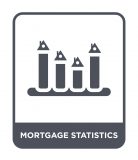By The Spy on
December 12, 2019
Rates are breaking out. Canada’s widely watched 5-year bond yield just hit a seven-month high. That’s typically bullish for fixed mortgage rates. Trendsetter RBC wasted no time this morning. It ran a press release announcing it was boosting 3-, 4- and 5-year fixed rates by 10, 20 and 20 bps, respectively. RBC doesn’t usually issue press releases when it’s merely...
read more
By The Spy on
November 24, 2019
Canadian government bond yields, which lead fixed mortgage rates, are essentially adrift at sea. They, like so many other global yields, seem to just be biding time until positive (or negative) trade news breaks out of Washington. There’s so much uncertainty out there that it makes even less sense than usual to try and time the market. When President Trump...
read more
By The Spy on
November 19, 2019
Where did all the first-time buyers go? New data from CMHC suggests there are noticeably fewer of them out there (stats below). Maybe they’re hibernating until they can save up a bigger down payment, amid home prices that (in many regions) remain near record highs. Or, perhaps fewer of them are able to pass the mortgage stress test given today’s...
read more
By The Spy on
November 15, 2019
More people are researching mortgages online before they confront a lender or broker. That’s the good news. The bad news is that less than 1 in 3 are using sites like this to research mortgage rates, if CMHC’s latest data is accurate. The percentage that do use rate sites is up materially from last year’s 22%, but still too many...
read more
By The Spy on
November 10, 2019
If you knew where inflation was headed, you’d have a great chance of knowing where mortgage rates were headed. The latter rises and falls with the former. That’s why so many people try to predict inflation. Among the many who think they know where it’s going: The 100 senior Canadian businesspeople surveyed by the Bank of Canada every quarter 2...
read more
By The Spy on
November 6, 2019
When Scotiabank launched its eHOME Mortgagein March, it promised a faster, easier way to get a big-bank mortgage, with compelling rates to boot. Since then, industry-types have watched and wondered if eHOME would get much traction. It has. “When we built Scotiabank eHOME, we set out to create a unique mortgage experience for our customers, focused on simplicity, security, transparency...
read more
By The Spy on
October 23, 2019
A new 5-year fixed will cost you more today than it did last month, but not as much as normal. Canada’s biggest banks have been boosting their advertised mortgage rates following a 1/4-point pop in their funding costs over the last two weeks. Let’s go to the charts… The following graph shows what’s been happening. It’s a picture of Canada’s...
read more
By The Spy on
September 10, 2019
Some people think we’re in a bond market bubble. If that’s true, and we’re not declaring it is, the last four days are kinda what you get when a bubble pops. Bond investors are in a momentary state of panic. Canada’s bellwether 5-year government yield has catapulted 31 basis points in just four trading days. The last time that happened...
read more
By The Spy on
July 22, 2019
“There’s no doubt that mortgage rate declines since the start of this year have contributed to stabilize Canada’s housing market,”said RBC economist Robert Hogue in a report last week. That might be news to some, given the rates used to qualify borrowers for approval have barely moved in 2019. We asked Mr. Hogue to share what he sees and he...
read more
By The Spy on
July 18, 2019
The most important rate in the mortgage industry has dropped. Better late than never. The benchmark posted 5-year fixed rate has fallen from 5.34% to 5.19%. It’s the firstchange since May 9, 2018. And it’s the first decrease since Sept. 7, 2016, despite a 106-basis-point nosedive in Canada’s 5-year bond rate since November 8. Why it Matters The benchmark rate...
read more
 log in
log in









